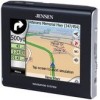Audiovox NVX225 User Manual - Page 17
Switches in the Quick menu, Virtual keyboards, ABC-type keyboards, Use Backspace
 |
UPC - 689076576284
View all Audiovox NVX225 manuals
Add to My Manuals
Save this manual to your list of manuals |
Page 17 highlights
Use these buttons the same way as you would other switches. Tap them anywhere to toggle between the enabled and disabled states. 3.2.6 Switches in the Quick menu The switches of the Quick menu (4.7.2) behave as normal switches but they look different in order to fit in with the other menu buttons. Tap the button to toggle between the enabled and disabled states. 3.2.7 Virtual keyboards The NVX225 Navigator is designed in a way that you only need to enter letters or numbers when it is inevitable. In these cases a full screen keyboard pops up that can easily be operated with your fingertips. You can choose between a separate ABC and numeric keypad, or a set of QWERTY-type keyboards that contain both letters and numbers. The NVX225 Navigator will remember your last choice and offer it the next time you need to enter data. The alphabetic keyboards in The NVX225 Navigator do not contain special characters, because you do not need to enter accents when searching for a destination. Type only the base letters (the letter most similar to the accented one) and The NVX225 Navigator will search for all their combinations in the database (e.g. for the street 'Néfrue' you only need to type 'Nefrue', and the rest is done by the program). When you type in POI or track log names, The NVX225 Navigator will automatically turn all initials into capitals to create names that look pleasant. 3.2.7.1 ABC-type keyboards These keyboards contain only letters (Latin, Hebraic, Greek or Cyrillic). If you wish to enter numbers, you need to tap the Keys ( ) button to switch to the numeric keyboard. Use Backspace ( ) to delete the last letter you have entered if you have made a mistake, tap Space ( ) to enter more words, and hit Done ( ) to finish entering the text. 17















